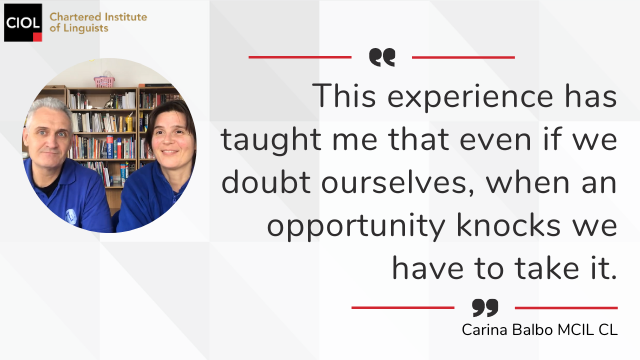-
QUALIFICATIONS
- For Linguists Worldwide
- For UK Public Services
- Preparation
- Policies & Regulation
-
MEMBERSHIP
- Join CIOL
- Professional Membership
- Affiliate Membership
- Chartered Linguist
- Already a member?
- Professional conduct
- Business & Corporate Partners
-
LANGUAGE ASSESSMENTS
- English
- All Other Languages
-
CPD & EVENTS
- Webinars & Events
- CIOL Conferences
- Networks
- CIOL Mentoring
-
NEWS & VOICES
- News & Voices
- CIOL eNews
- CIOL Awards
- The Linguist Magazine
- Jobs & Ads
-
RESOURCES
- For Translators & Interpreters
- For Universities & Students
- Standards & Norms
- CIOL & AI
- All Party Parliamentary Group
- In the UK
- UK Public Services
- Find-a-Linguist
Imparting wisdom
As CIOL launches a new mentoring platform, translator mentor Helle Gulowsen considers why people mentor and how it benefits them
 When CIOL launched its mentoring platform earlier this year, the decision to sign up was an easy one. Partly, of course, in the hope that the knowledge and experience I have built up over many years working as a freelance translator could be of some benefit to others, but also in support of a programme that I wish had been available when I started out in the industry.
When CIOL launched its mentoring platform earlier this year, the decision to sign up was an easy one. Partly, of course, in the hope that the knowledge and experience I have built up over many years working as a freelance translator could be of some benefit to others, but also in support of a programme that I wish had been available when I started out in the industry.
Becoming a translator was, for me, a career change after a number of years working in hotel management. It was a carefully planned move, but I had not anticipated what a very lonely undertaking it would be. Although I had acquired business skills that were useful in terms of the practical aspects of setting up as a freelancer, the work-related challenges of those early days were many. I found myself in a situation where I had a lot of questions but no one to ask. I was reluctant to contact fellow translators for fear of being perceived as incompetent.
Thankfully I was, and still am, lucky enough to have great colleagues who have been very kind and generous with their advice and support over the years, but I strongly believe that a mentoring scheme through which I could have sought advice and support in a structured setting would have made the process far easier.
Mentoring vs coaching
There are many forms of mentoring, and on the CIOL platform it is defined as a process “where a more experienced person passes their skills and advice to someone less experienced who is looking to develop those skills and improve their performance.”1
Although this occupies the same developmental space as coaching, it differs in the sense that it is up to the mentee to set the pace and to establish the desired outcome. The mentor then offers their perspective, and provides support and guidance. Coaching, on the other hand, is more task-orientated and performance-driven, and is a learning process in which the coach often will take charge and set the goals for the learner.2
Defining the roles
Having someone to whom you can pour out all the wisdom you have accumulated over the years can do wonders for a mentor’s self-confidence, but it is essential to realise that the mentee is the most important person in the relationship. The role carries great responsibility, and when we contribute our knowledge and experience, we also tend to share our values and beliefs.
When approached with caution, mentoring is a great opportunity to promote high standards in the profession. Speed and targets should be set by the mentee, and it is crucial that a mentor listens and asks questions before offering advice. A good mentor will challenge their mentee by offering a different perspective, but will not be a problem-solver, become too involved, or take the role of manager and decision-maker. Learning and development are to be stimulated through advice and encouragement.
As a mentee, it is important to realise that your mentor is not someone who will tell you what to do, take charge of your career, or do the work for you. He or she is there to act as a sounding board in the process of finding a solution, to provide support, and to point you in the right direction. You have to be clear what you expect from the relationship and set your own objectives.
A good fit
For this to work, there needs to be a good fit between mentor and mentee. Although everyone has something to contribute – be it specialist knowledge, career development, technical skills, behavioural competencies, business management, confidence-building or general advice – it is important to be open and honest in terms of the support you are able to provide and the amount of time that you are willing to offer.
My first mentee was in the process of establishing herself as a freelance translator following a career in international development and economics. As she was in a situation similar to my own when entering the profession, I could easily identify with her challenges and I felt that I had something to contribute. Furthermore, her previous experience meant that the time commitment she required was achievable for me.
Encouraged by this success, I took on a second mentee – also a very capable individual, but one who was heading in a direction of which I have limited knowledge. My lack of relevant experience to provide adequate advice and support soon became evident, and after some discussion we agreed that a change of mentor would be the best way forward.
A new platform
Working within the CIOL mentoring framework is relatively straightforward. It provides clear steps for how to build a relationship and maintain momentum, and includes tools such as SWOT analysis (identifying strengths, weaknesses, opportunities and threats) and SMART goals (i.e. specific, measurable, achievable, relevant and time-bound) to establish where you are now and where you want to be.
Outcomes
Mentoring has not only been a great learning process, it has also been an interesting and enriching experience. A good mentoring relationship is a two-way process through which you get to pass on knowledge and give something back to others at the same time as gaining a different perspective on your own practices, which can also prompt you to evaluate those practices.
In an industry where we often work in isolation, this opportunity to establish contact with colleagues, and learn from each other in a structured way, is invaluable. It may even help to combat loneliness and improve mental wellbeing in our profession.
On a final note, I would like to thank my first mentee for her input and patience. I am sure she will achieve her goals, and hopefully I have contributed to this. CIOL’s new platform is a great initiative, and I would encourage anyone able and willing to give some of their time to consider signing up.
For further details, see ciol.org.uk/benefits/mentoring.To send feedback, email comms@ciol.org.uk.
Notes
1 See mentoring.ciol.org.uk/mentor/training/240
2 Webster, V and Webster, M ‘The Difference Between Coaching and Mentoring’, Leadership Thoughts; www.leadershipthoughts.com
More
The Chartered Institute of Linguists (CIOL), Incorporated by Royal Charter, Registered in England and Wales Number RC 000808 and the IoL Educational Trust (IoLET), trading as CIOL Qualifications, Company limited by Guarantee, Registered in England and Wales Number 04297497 and Registered Charity Number 1090263. CIOL is a not-for-profit organisation.








